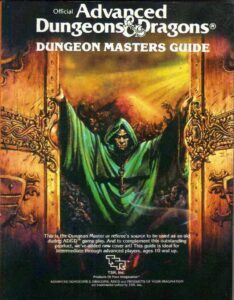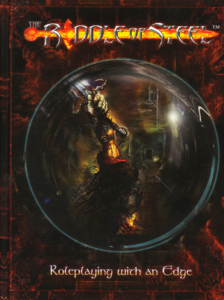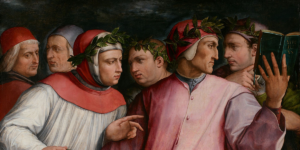“The entire history of our hobby consists of a series of footnotes to OD&D.”
Some years ago I realized that I’d crossed a threshold: roleplaying games had gone from something I’d been doing for a long time to something I’d been doing most of my life. At this point, I’ve been running, playing, and hacking role-playing games for over twenty-five years. I’ve been writing my own role-playing games for fifteen, and as of last month I’ll have been writing about role-playing game for nine years. As I attempt to weave together all the threads that have become Zornhau into a single thing, it feels worth looking back at how I got here.
My first experiences with the hobby were at the very end of the 90s. When I was all of nine years old, I came across the first edition AD&D Dungeon Master’s Guide. It was collecting dust along with a pile of other well-worn fantasy books, the entire box purchased for the great sum of a single dollar. Two years later, I realized that it was an actual game.

I can say without a hint of hyperbole that that book changed my life. My interests from fiction, cinematography, writing, and storytelling, to history, mythology, philosophy and religion, all of it sprang forth from that well. Role-playing gave me license to create worlds and in so doing unleashed an incredible curiosity about our own. I wouldn’t be who I am today without it.
In an odd twist, my fate was further sealed in an even more subtle way: there were several years between discovering Dungeons & Dragons and getting hold of the accompanying Player’s Handbook. We played the game with the DMG alone, along with whatever house-rules and patches we came up with along the way. From the very start, running a game and developing for that game were, for me, inseparable activities. Two halves of the same whole.
In time we moved on from fantasy. By the 00s I had discovered a local comic book shop and game store and fell in love with Alternity: an interesting and ridiculously crunchy, fiddly sci-fi game that I loved to death despite its flaws. Their Star*Drive campaign is to this day the only pre-made setting I’ve ever run for more than a session or two. Tragically, Alternity seems to have been a casualty of the WOTC takeover of TSR, the ambitious line discontinued by 2000.

Not that this stopped us. We happily played it in my circle of friends for years until eventually discovering the Cyberpunk 2020 rules and doing a nigh-complete conversion of one into the other. The resulting work was my first completed RPG project, its ancient Microsoft Word docs lost to ages.
It was about this time that I stumbled into the massive, creative RPG space online. We swiped and played and remixed endless varieties of games we found online, nearly all of them mishmashed heartbreakers hosted on blogspots and ancient geocities pages. It was in the middle of this creative soup that I eventually found my way to then unheard of little gems like Sorcerer and The Riddle of Steel. From there, I wound up stumbling into The Forge and god knows what else.

This was a time of massive growth in my creative life. TROS in particular left marks on me that I need not explain here, not in this post, anyway. Both TROS and The Forge played massive roles in shaping how I designed games and how I thought about gaming. Most importantly, it taught me that game design was itself a subject worth thinking about; that it was a subject that could be analyzed and understood, discussed in meaningful ways to practical ends.
This is when I began writing in earnest.
In the years that followed, I began the project that would eventually become Sword & Scoundrel. I’ve been incredibly fortunate in having people who followed me on that journey since, some of whom have gone on to become close friends. They are the reason that I am ultimately writing this now.
It’s hard to believe the first strokes of that project began all the way back in 2011. I’d be tempted to curse the time it’s taken, but I am ultimately glad it has. That harrowing expanse of time has allowed me to at least attempt to bridge the vast gap between my ability and my taste. This may itself be worth another post, another time. What is most important here is what came between:
Enter: the OSR.

I credit the OSR movement with a great deal of my development as a designer and as a consumer of games. Despite its current most vocal advocates standing in staunch opposition to anything “story game,” the two competing visions of what role-playing games “should be” have only given me a taste for the contrasts. Through either lens, the strengths of the other is highlighted, helping me better understand how to approach what I wanted from the experience and how to design around it. The OSR space has not only become another passion of mine, but a whetstone against which I am further sharpened. It is no coincidence then that despite by best-known project clearly descended from more narrative stock, so much of my writing explores the opposite. But then, this is nothing that hasn’t been said better by better:
In a very real sense, every RPG, even those specifically written as a rejection of Dungeons & Dragons, are its heirs. To paraphrase Alfred North Whitehead, the entire history of our hobby consists of a series of footnotes to OD&D. It’s all just a matter of emphasizing this aspect of the game or downplaying that one, adding and subtracting to the basic template laid down by Gygax and Arneson between 1970 and 1974.



